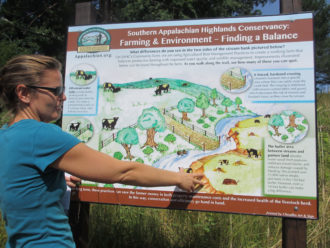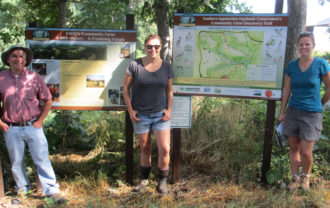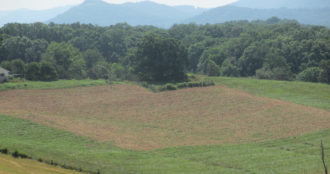ALEXANDER, North Carolina – Over 100 acres of gently rolling grazing land, woodlands and stream corridors just outside of Asheville, NC is the site of an educational effort spearheaded by the Southern Appalachian Highlands Conservancy that combines environmental conservation with agriculture using sustainable ag practices.
The program, known as the “Community Farm & Food Project: Access to land, livelihood and learning” was funded, in part, through a Southern Sustainable Agriculture Research & Education (SSARE) Sustainable Community Innovation Grant.
“The idea behind the project is to blend conservation and agriculture and demonstrate how they can function together on one piece of land,” said Allison Kiehl, farmland stewardship and sustainability director of the SAHC.
The main component of the effort is the Beginning Farmer Incubator – a program that provides beginning farmers with temporary access to land, equipment, and infrastructure at reduced rates, as well as training to help prepare them for successful farm management and ownership. Over 35 acres have been set aside for farmers interested in a wide variety of agricultural endeavors, all of which need to have a sustainable ag focus.
“It’s giving small-scale beginning farmers the opportunity to access land, equipment, resources and financial connections they wouldn’t otherwise have to get started in an ag business, all the while filling the gap left by those retiring and keeping farmland in this area viable and productive,” said Yael Girard, SAHC community farm and food assistant.
Farmers who are chosen can stay in the program for up to five years. SAHC requires two years of farming experience, a written business plan, the commitment to grow products with ecologically sound practices, the ability to work a minimum of 20 hours a week on the farm, a commitment to help collectively maintain the farm site, and a willingness to work collaboratively with staff and other participant farmers. In exchange, farmers receive support, training and tools to help them manage successful farm business on their own.
So far, SAHC staff has enrolled one farmer into the program, who is managing two acres of cut flowers for the local farmers markets and area retailers. The farmer’s ultimate goal is to market to area bridal markets.
The remaining 60 acres of the land SAHC is managing have been set aside as an educational tool showcasing a variety of conservation practices, including the restoration of 3,000 linear feet of stream as a model for integrating wildlife habitat conservation and agriculture, and demonstrating water quality; and the restoration of shortleaf pine trees, which are on the decline throughout the Southeast.
“The folks that donated the 100 acres to the land trust in 2010 were conservation minded. The family was among the first in the area in the early 1950s to have a conservation plan for their land,” said Carl Silverstein, SAHC executive director. “When we received the land, there was an unwritten understanding that we’d keep the land in farming and manage it with conservation in mind, and we are working hard to do just that. It’s really a big part of SAHC’s mission.”
To learn more about the SSARE projects (CS11-086 and CS12-088), “Community Farm and Food Project” Phase I and II, visit the SARE projects database and search by project numbers.
To learn more about the SAHC Incubator Program, full program description and an application, contact Allison Kiehl at allison@appalachian.org.
To learn more about the Southern Appalachian Highlands Conservancy, visit https://www.appalachian.org.
--30—
Published by the Southern Region of the Sustainable Agriculture Research and Education (SARE) program. Funded by the USDA National Institute of Food and Agriculture (NIFA), Southern SARE operates under cooperative agreements with the University of Georgia, Fort Valley State University, and the Kerr Center for Sustainable Agriculture to offer competitive grants to advance sustainable agriculture in America's Southern region.


